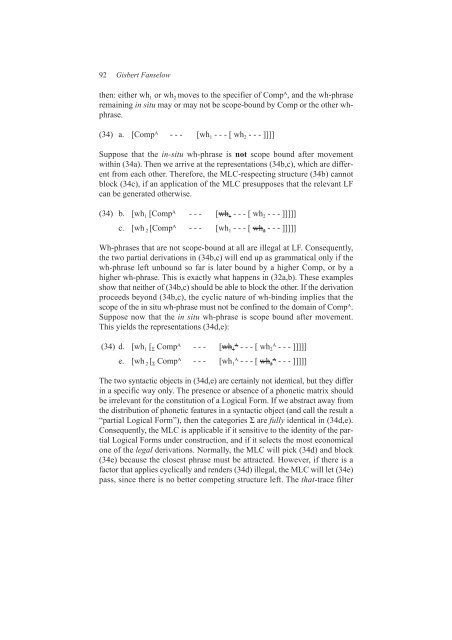Minimality Effects in Syntax · The MLC and Derivational Economy ...
Minimality Effects in Syntax · The MLC and Derivational Economy ...
Minimality Effects in Syntax · The MLC and Derivational Economy ...
You also want an ePaper? Increase the reach of your titles
YUMPU automatically turns print PDFs into web optimized ePapers that Google loves.
92 Gisbert Fanselow<br />
then: either wh 1 or wh 2 moves to the specifier of Comp A , <strong>and</strong> the wh-phrase<br />
rema<strong>in</strong><strong>in</strong>g <strong>in</strong> situ may or may not be scope-bound by Comp or the other whphrase.<br />
(34) a.[Comp A - - - [wh 1 - - - [ wh 2 - - - ]]]]<br />
Suppose that the <strong>in</strong>-situ wh-phrase is not scope bound after movement<br />
with<strong>in</strong> (34a). <strong>The</strong>n we arrive at the representations (34b,c), which are different<br />
from each other. <strong>The</strong>refore, the <strong>MLC</strong>-respect<strong>in</strong>g structure (34b) cannot<br />
block (34c), if an application of the <strong>MLC</strong> presupposes that the relevant LF<br />
can be generated otherwise.<br />
(34) b.[wh1 [CompA - - - [wh1 - - - [ wh2 - - - ]]]]]<br />
c.[wh 2 [CompA - - - [wh1 - - - [ wh2 - - - ]]]]]<br />
Wh-phrases that are not scope-bound at all are illegal at LF. Consequently,<br />
the two partial derivations <strong>in</strong> (34b,c) will end up as grammatical only if the<br />
wh-phrase left unbound so far is later bound by a higher Comp, or by a<br />
higher wh-phrase. This is exactly what happens <strong>in</strong> (32a,b). <strong>The</strong>se examples<br />
show that neither of (34b,c) should be able to block the other. If the derivation<br />
proceeds beyond (34b,c), the cyclic nature of wh-b<strong>in</strong>d<strong>in</strong>g implies that the<br />
scope of the <strong>in</strong> situ wh-phrase must not be conf<strong>in</strong>ed to the doma<strong>in</strong> of Comp A .<br />
Suppose now that the <strong>in</strong> situ wh-phrase is scope bound after movement.<br />
This yields the representations (34d,e):<br />
(34) d.[wh1 [ Σ CompA - - - [wh A<br />
1 - - - [ wh2 A - - - ]]]]]<br />
e.[wh 2 [ Σ CompA - - - [wh A<br />
1 - - - [ wh2 A - - - ]]]]]<br />
<strong>The</strong> two syntactic objects <strong>in</strong> (34d,e) are certa<strong>in</strong>ly not identical, but they differ<br />
<strong>in</strong> a specific way only. <strong>The</strong> presence or absence of a phonetic matrix should<br />
be irrelevant for the constitution of a Logical Form. If we abstract away from<br />
the distribution of phonetic features <strong>in</strong> a syntactic object (<strong>and</strong> call the result a<br />
“partial Logical Form”), then the categories Σ are fully identical <strong>in</strong> (34d,e).<br />
Consequently, the <strong>MLC</strong> is applicable if it sensitive to the identity of the partial<br />
Logical Forms under construction, <strong>and</strong> if it selects the most economical<br />
one of the legal derivations. Normally, the <strong>MLC</strong> will pick (34d) <strong>and</strong> block<br />
(34e) because the closest phrase must be attracted. However, if there is a<br />
factor that applies cyclically <strong>and</strong> renders (34d) illegal, the <strong>MLC</strong> will let (34e)<br />
pass, s<strong>in</strong>ce there is no better compet<strong>in</strong>g structure left. <strong>The</strong> that-trace filter
















